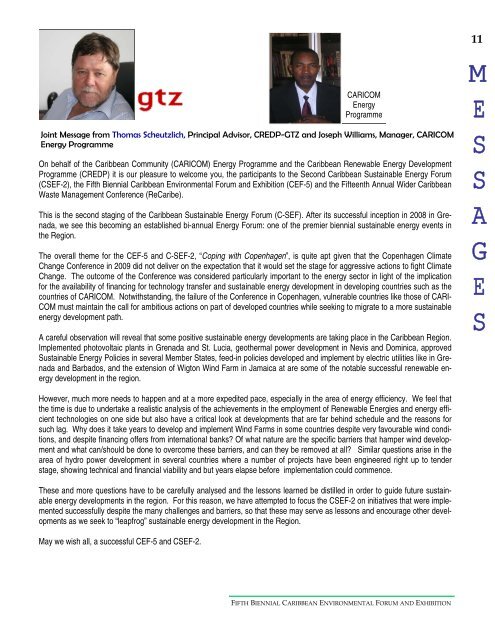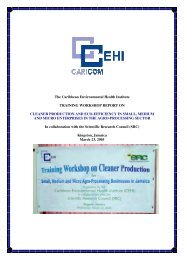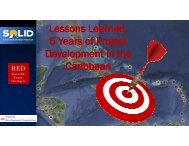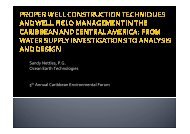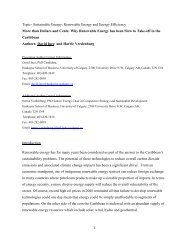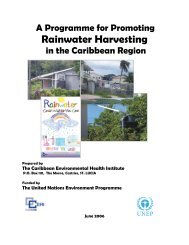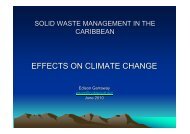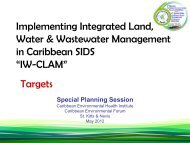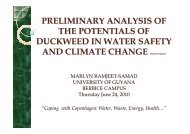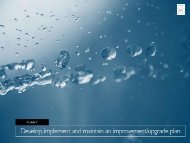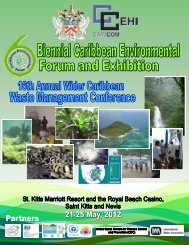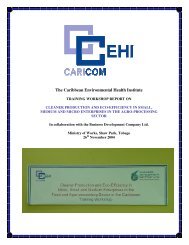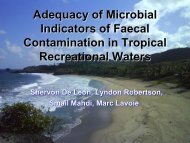conference magazine - Caribbean Environmental Health Institute
conference magazine - Caribbean Environmental Health Institute
conference magazine - Caribbean Environmental Health Institute
You also want an ePaper? Increase the reach of your titles
YUMPU automatically turns print PDFs into web optimized ePapers that Google loves.
11<br />
CARICOM<br />
Energy<br />
Programme<br />
Joint Message from Thomas Scheutzlich, Principal Advisor, CREDP-GTZ and Joseph Williams, Manager, CARICOM<br />
Energy Programme<br />
On behalf of the <strong>Caribbean</strong> Community (CARICOM) Energy Programme and the <strong>Caribbean</strong> Renewable Energy Development<br />
Programme (CREDP) it is our pleasure to welcome you, the participants to the Second <strong>Caribbean</strong> Sustainable Energy Forum<br />
(CSEF-2), the Fifth Biennial <strong>Caribbean</strong> <strong>Environmental</strong> Forum and Exhibition (CEF-5) and the Fifteenth Annual Wider <strong>Caribbean</strong><br />
Waste Management Conference (ReCaribe).<br />
This is the second staging of the <strong>Caribbean</strong> Sustainable Energy Forum (C-SEF). After its successful inception in 2008 in Grenada,<br />
we see this becoming an established bi-annual Energy Forum: one of the premier biennial sustainable energy events in<br />
the Region.<br />
The overall theme for the CEF-5 and C-SEF-2, “Coping with Copenhagen”, is quite apt given that the Copenhagen Climate<br />
Change Conference in 2009 did not deliver on the expectation that it would set the stage for aggressive actions to fight Climate<br />
Change. The outcome of the Conference was considered particularly important to the energy sector in light of the implication<br />
for the availability of financing for technology transfer and sustainable energy development in developing countries such as the<br />
countries of CARICOM. Notwithstanding, the failure of the Conference in Copenhagen, vulnerable countries like those of CARI-<br />
COM must maintain the call for ambitious actions on part of developed countries while seeking to migrate to a more sustainable<br />
energy development path.<br />
A careful observation will reveal that some positive sustainable energy developments are taking place in the <strong>Caribbean</strong> Region.<br />
Implemented photovoltaic plants in Grenada and St. Lucia, geothermal power development in Nevis and Dominica, approved<br />
Sustainable Energy Policies in several Member States, feed-in policies developed and implement by electric utilities like in Grenada<br />
and Barbados, and the extension of Wigton Wind Farm in Jamaica at are some of the notable successful renewable energy<br />
development in the region.<br />
M<br />
E<br />
S<br />
S<br />
A<br />
G<br />
E<br />
S<br />
However, much more needs to happen and at a more expedited pace, especially in the area of energy efficiency. We feel that<br />
the time is due to undertake a realistic analysis of the achievements in the employment of Renewable Energies and energy efficient<br />
technologies on one side but also have a critical look at developments that are far behind schedule and the reasons for<br />
such lag. Why does it take years to develop and implement Wind Farms in some countries despite very favourable wind conditions,<br />
and despite financing offers from international banks? Of what nature are the specific barriers that hamper wind development<br />
and what can/should be done to overcome these barriers, and can they be removed at all? Similar questions arise in the<br />
area of hydro power development in several countries where a number of projects have been engineered right up to tender<br />
stage, showing technical and financial viability and but years elapse before implementation could commence.<br />
These and more questions have to be carefully analysed and the lessons learned be distilled in order to guide future sustainable<br />
energy developments in the region. For this reason, we have attempted to focus the CSEF-2 on initiatives that were implemented<br />
successfully despite the many challenges and barriers, so that these may serve as lessons and encourage other developments<br />
as we seek to “leapfrog” sustainable energy development in the Region.<br />
May we wish all, a successful CEF-5 and CSEF-2.<br />
FIFTH BIENNIAL CARIBBEAN ENVIRONMENTAL FORUM AND EXHIBITION


